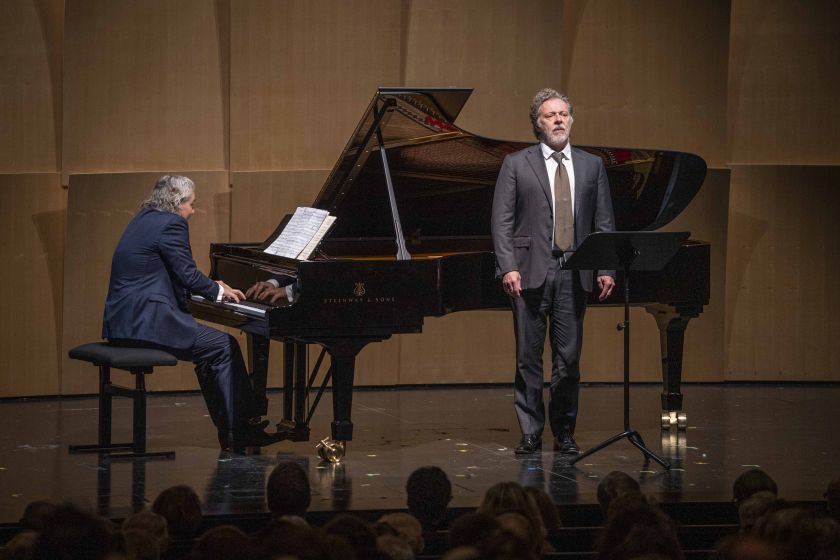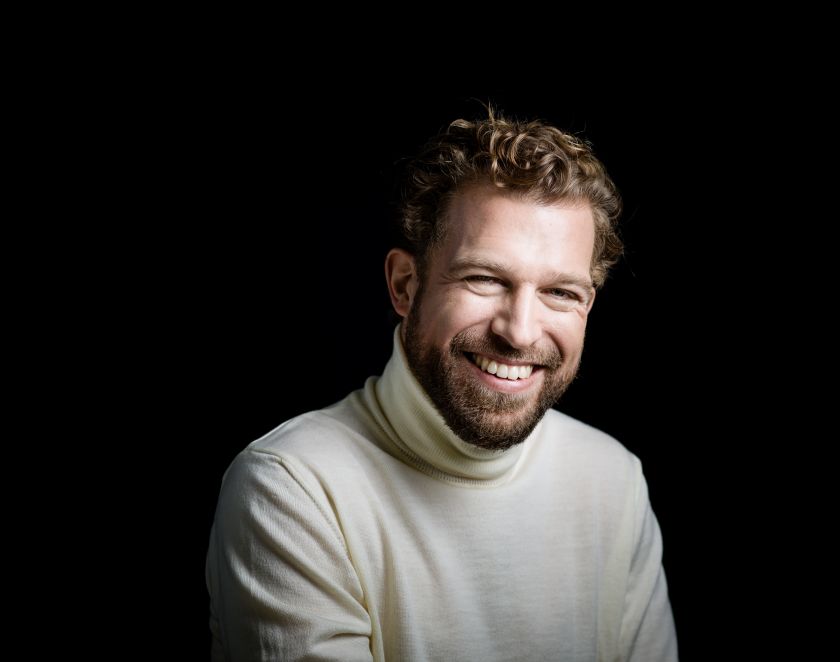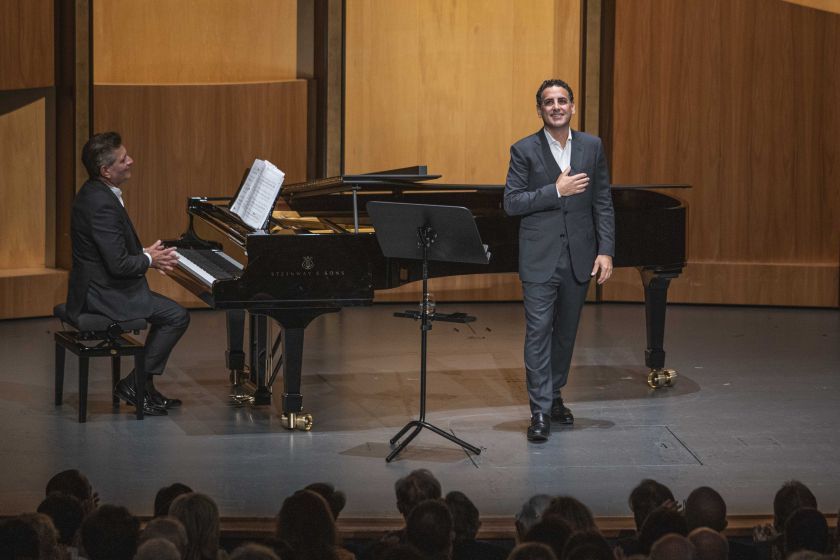Soulful Songs
Congenial interplay for symbioses of word and melody, poetry and score.

In the lied recitals and the canto lirico series outstanding contemporary voices once again entice audiences with great emotions in small forms.
“What I truly am is not yet clear to me. Whether I am a poet – for one cannot become one – will be for posterity to decide,” a teenager once wrote in his diary. His name was Robert Schumann. Music and literature were the two focal points of his talent, and which one would win out was a mystery to him for a long time. Were Homer, Klopstock, Hölderlin his lodestars? Or Beethoven and Schubert? The logical combination of both elements was the inspiration of instrumental pieces by literature, and writing about music. Only in third place did Schumann consider setting poetry – thereby creating an essential, immortal contribution to the treasure-trove of German song.
Poetry, not only with added music, but truly translated into music; intimate sentiments taking wing in song, yet never losing profundity: that is what moves us about art song, that artform which first truly blossomed during the romantic era. If there has ever been a singer whose mission was to do equal justice to the two poles of words and tones in Schumann’s songs with the same extreme passion, it is Christian Gerhaher. Together with his long-standing piano partner Gerold Huber, the Bavarian Kammersänger has chosen a diverse recital programme which makes a plea for Robert Schumann and no other composer – a plea for suffering and longing, for farewell and loss. “So viele Worte dringen / Ans Ohr uns ohne Plan / Und während sie verklingen, / ist alles abgetan,“ – “So many words beleaguer / our ears, without plan / and while they fade, / everything is dismissed.” Thus some of the lyrics to Opus 96/3, a setting of words by August von Platen. In the programme, the Kerner-Lieder Op. 35 occupy a central place, and Gerhaher describes it as an “epic cycle”, unfairly ignored in favour of the “poetic” Eichendorff song cycle and the “theatrical” Dichterliebe of Heine settings.
Masks, Facades, Double-Entendres. The artistic partnership between the baritone Matthias Goerne and Salzburg’s Artistic Director Markus Hinterhäuser at the piano has been widely celebrated. This time, they explore two fascinating song cycles, both encoded in fascinating ways. On the one hand, there is the Michelangelo Suite, in which Dmitri Shostakovich set poems by the Renaissance artist, but was really also spotlighting his own life under communism – the result is rigid and sparse, with a piano part occasionally veering into the downright ascetic. On the other hand, there is Gustav Mahler’s multi-faceted explorations of the world of Des Knaben Wunderhorn, that anthology of supposed folk poems published from 1805 onwards by the young literary lights Achim von Arnim and Clemens Brentano – whose creations the poems in the spirit of “ancient German songs” mostly were. Mahler felt the double-entendres, the abysmal nature of this supposedly naïve language to be uncommonly attractive: while symphony and song were the two poles of his output, Des Knaben Wunderhorn acted like a Bible of his song compositions, being the main source of his texts, apart from which he only valued Friedrich Rückert’s works (and his own words). This recital features one of his soul-wrenching Kindertotenlieder.

Soul-wrenching might be another word for the fate of the lyrical I in Franz Schubert’s Schöne Müllerin. She – or, more precisely, the daughter of a rich mill-owner – is the object of the loving and longing of an enraptured miller boy on his wanderings. Soon he dreams of shared future bliss, but then competition appears in the shape of a hunter. The inevitable happens: the boy loses out – and throws himself into the water of a brook in desperation. Inspired by a joint poetic creation with divided roles he experienced at a Berlin salon, the poet Wilhelm Müller retold this story in a cycle of poems, publishing it in 1821. For his song cycle, written a few years later, Schubert eliminated the romantic irony of prologue and epilogue, turning the febrile emotional world of the miller boy into a direct, uncompromising and unsparing reality while also lifting it onto a higher, more poetic level through his music. The Salzburg combination of Julian Prégardien and Sir András Schiff – a young singer with a precious tenor voice and an experienced all-round musician at the piano – promises a special experience.
The special synergy between a glorious mezzo-soprano voice with an astute presentation and a prudent piano partner will once again be evident in the collaboration between Elīna Garanča and Malcolm Martineau. In addition to popular selections from the song repertoire of Richard Strauss and Henri Duparc, they present works by Latvian composers which Garanča’s mother sang to her as a child. Songs by Sergei Rachmaninov underscore her love for the Russian repertoire.

Dramatic “Lirica”. Anyone inclined to instinctively translate “canto lirico” as “lyrical singing”, and therefore under the impression that the Salzburg Festival’s series presents songs from the regions between Venice and Palermo, is in for a pleasant surprise. “La lirica” is indeed poetry, the art of lyrical writing – but a “teatro lirico” is not a stage for rhyme-smiths’ writings, but simply an opera house. Thus, “la lirica” denotes opera in general. “Der Arie ihr Recht! Auf die Sänger nimm Rücksicht! Nicht zu laut das Orchester…“ (“The aria is important! Pay heed to the singers! The orchestra mustn’t be too loud…”): this was the motto of the preface Richard Strauss wrote for his Capriccio, the final mature work gracing the Festival’s opera programme this summer. In this “conversation piece for music in one act”, for which Richard Strauss and his friend, the conductor Clemens Krauss, wrote the libretto, this advice is given by the theatre director La Roche, a profound and crafty connoisseur and practitioner of his profession with both feet on the ground. It is telling that La Roche does not even mention the text here, even though the struggle for dominance between text and music is the underlying theme of Capriccio. In the series “Canto Lirico”, however, this struggle is overcome on a higher level – as it is in the Festival’s song recitals.
This begins with the mezzo-soprano Lea Desandre, last year’s celebrated Cherubino in Le nozze di Figaro. “Semper Dowland, semper dolens” – always Dowland, always doleful: ennobled by courtly composure and sublimated into melancholy, the sorrow of the Elizabethan era is embodied in the music and person of John Dowland, the most famous lutenist of his time. Desandre and the Ensemble Jupiter, led by lutenist Thomas Dunford, follow the trace of teardrops through his compositions and on to Henry Purcell – and the heart-wrenching farewell of Dido, bidding her beloved Aeneas and life itself adieu. –
The vocal and instrumental environs of the baroque opera giants Claudio Monteverdi and George Frideric Handel form the field explored by Kate Lindsey, Jonathan Cohen and the Ensemble Arcangelo. Lindsey, who enchanted the Festival audience as Nerone in Monteverdi’s Poppea in 2018, now slips into various embodiments of Nerone in Handel’s oeuvre.
Finally, no “Canto Lirico” could be complete without Juan Diego Flórez, who will perform a glittering series of arias and songs by Rossini, Bellini, Donizetti, Massenet, Verdi and others with Vincenzo Scalera at the piano, and then might grab a guitar to sing South American evergreens: ¡ay, caramba!
Walter Weidringer
Translation: Alexa Nieschlag
First published on 11.05.2024 in Die Presse Kultur Spezial: Salzburg Festival
